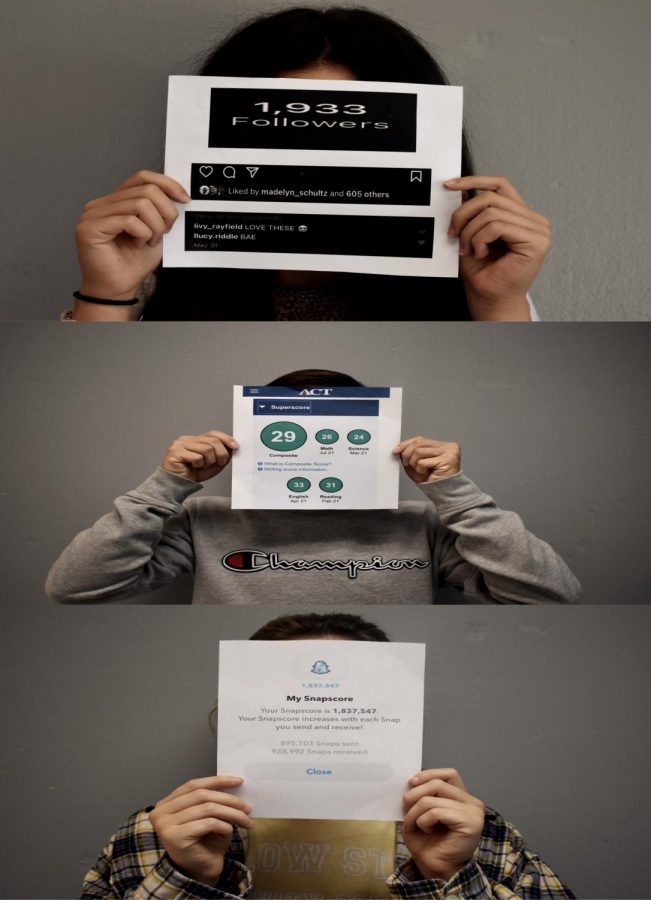You are more than a number
October 2, 2021
1,933 Instagram Followers. Liked by 605 others. 165 comments. A Snapchat Snapscore of 1,837,547. 895,103 Snaps sent. 938,992 Snaps received. An ACT Superscore of 29. 26 in Math, 24 in Science, 33 in English, and 31 in Reading.
Every one of these numbers is exactly that: just a number. Just a number typed out on a screen that I’m sure you didn’t even read completely in your head. I’m sure you just skimmed past it, looking at it long enough to realize it was a numeral but not long enough to see its true numerical value.
However, it seems that today’s society seems to think otherwise about these numbers. Instagram followers, Snapchat Snapscore, ACT scores—they all have one thing in common: we are told that these numbers define us. We are told that these numbers make us who we are.
I’m here to tell you they don’t. They don’t define you in the least, and they aren’t what make you, you.
With the world being so technologically advanced in this day and age, social media has become one of the most influential things to affect all of humanity. It holds a power that no inanimate thing has ever held before.
It didn’t always use to be like this, though.
“Looking back 5 years ago,” says CCCHS junior, Camry Moss, “[On Instagram] nobody cared about the likes, the views, or the comments that appeared on our pages. We posted things that made us happy, things that made us laugh.”
Today, we are expected to wear the trendiest clothes, be in the most aesthetic places, and have the cleverest captions. All of these things will, in turn, reflect in more numbers—more likes, more comments, more followers. More numbers mean more worth in the Instagram realm.
This impossible standard that society has set is just a continuous cycle that will always leave you unsatisfied because nothing will ever be enough. No number that you reach will be enough for you because there is always someone with more—more followers, more likes, more comments. There will always be people with cuter clothes, prettier locations, and better captions.
Moss goes on to say, “Living up to society’s expectations was something that I’ve attempted to achieve for as long as I can remember.” We can all say the same. We’re human. We seek approval and reassurance. It’s just how we were made.
Moss finally had a realization, though. “I began to realize how stupid it was to let social media control my life. I had to tell myself that life is worth more than the number on my screen.”
One thing Moss has done in regards to recognizing she’s more than a number is turn off the “Likes” feature on Instagram. This feature turns off the ability to see how many likes a post gets, and instead, it just shows “Liked by someone and others.”
Does the fact that Instagram itself has installed this feature into its own app prove there is an issue with this certain standard? I think so.
I think Instagram has realized their own humanization of numbers has been taken a bit too far. Nonetheless, the feature definitely has a positive outlook despite its paradoxical existence.
“The power to control the likes on my page gave me the freedom to post whatever I wanted with no regret,” Moss says. “Society could no longer make me feel worthless because I didn’t reach the ‘acceptable’ like count.”
Along with Instagram’s numbers, Snapchat also has a number that apparently tells people everything they need to know about you: your Snapscore.
According to Maya Kosoff, a reporter for Business Insider, “Snapchat says your score is the combined number of Snaps you’ve sent and received. You get one point for every Snap you send and a point for every Snap you receive.”
From this definition, it sounds like a game, a game you want to win. However, over time, this positive connotation begins to wear off, as you gain the belief that the higher your score goes up, the more of a tool you became.
Apparently, if you are a girl with a high Snapscore (preferably over one million), that means you Snapchat way too many boys, and that denotes you a name I choose not to say. On the flip side, a boy with the same Snapscore is considered to talk to way too many girls, which again gives a derogatory title.
Simply because your Snapchat score exceeds a certain standard, you are considered to be less than pure. You’re considered to have no moral value.
Isn’t it crazy how we’re told a number can indicate that much of our life, even with no proof of such actions? It’s simply because you’re a social person and enjoy keeping in touch with a lot of people.
It doesn’t matter. Once you’ve reached a certain amount, you’re going to have a label slapped on your forehead for all to see, setting you as a shameful outcast.
Even those who don’t have Snapchat or don’t use it much, whatever the reasoning for not being a consistent member, all know what it means to have a high Snapscore.
The stereotype is such a normal thing to society that everyone knows what it is and what it means.
Newcomer to Snapchat, CCCHS sophomore Brayden Tomberlin, says, “The social norms people have made about your SnapScore number have affected the way I use Snapchat.”
She goes on to say, “I try not to snap a ton of people, I leave a ton of people on opened, and I constantly watch to see if my SnapScore is ‘too high.’”
Is it not sad that people are having to monitor how they use Snapchat because of a standard we ourselves have put into place?
This standard creates much more problems than regulating your app usage, though. This standard creates the problem of making people struggle with their own self-worth.
Tomberlin says, “A piece of advice I would give to someone struggling with the concept of their worth being more than a number is to be yourself. Your ‘number’ doesn’t matter. It’s being true to yourself and others that matters.”
It’s easier said than done for sure, but Tomberlin’s right: the first step in getting past those burning questions in your mind of “Am I enough? What am I doing wrong? How does this make me that?” is just letting it go.
Be yourself. Snapchat who you want, when you want, however many times you want. Snapchat girls, boys, cousins, friends–you can Snapchat no one if you like.
It doesn’t matter who you Snapchat, when you Snapchat them, or how often you Snapchat them. It doesn’t matter how high your SnapScore gets.
Because none of those numbers make you, you.
They don’t tell the world that you have no respect for yourself. They don’t tell the world anything, in fact, except that you solely have the very popular app Snapchat, which almost 250 million people have.
So, like Tomberlin said, be true to yourself and others, knowing that both of the aforesaid are so, so much more than how many Snaps you’ve sent and received.
Another one of society’s expectations that have been put into place isn’t technology-based or social media-based. It’s test scores.
ACT and SAT scores have become numbers that mean more than numbers. They mean intelligence. They mean college scholarships. They mean your future. They mean your worth.
Luke Beachboard, a senior at CCCHS, talks about how, in the first 11 grades of his life, he was worried about “looking good on paper.”
He goes on to say there’s a “huge pressure from schools themselves when money is involved.” We’re told, “the more money we get, the easier it is to succeed.”
So many others feel the same pressure that Beachboard felt. We are pressured to do well on these tests from the start of kindergarten. Our whole academic careers are leading us up to these tests, and to do badly on them is less money, and less money is to fail.
That’s what they tell us.
But Beachboard came to a realization: you have to “take a step back and realize there is more to life than your career.” There is more to life than the ACT and test scores and college scholarships.
You have to look at the people around you. Those people that you look up to, the ones who have impacted you. “Try and realize why what they’ve done for you to make you look up to them,” Beachboard says.
Is it how high their ACT score is? Is it how much money they got for college scholarships? Is it the career they have?
Beachboard closes with, “Understand that it’s not their paper expressions that makes you look up to them. It’s their personal connection.” If they are more than a number to you, why would you look at yourself as only a number?
All in all, there are so many ways in which we, as a society, have set standards that make numbers define who we are. There are more scenarios than just Instagram, Snapchat, and test scores.
I’m giving you a mission to remember when you’re starting to believe the lies of societal standards: step back. Step back and just try and find it in yourself that you are so much more than any number of likes or scores or grades or whatever it may be.
The first step is realizing it, and then the hard part is believing it. But I believe in you. I’ve been in your shoes way too many times to count, so just trust me. Knowing and believing that you’re more than a number will create so much peace in your life.
Next, after you’ve come to the realization of your own self-worth, I challenge you to promote these beliefs to others. Take it upon yourself to make others know they are also not just a number.
Defy social norms. Ignore the numbers. Focus on what truly matters.
Because you are more than a number.




